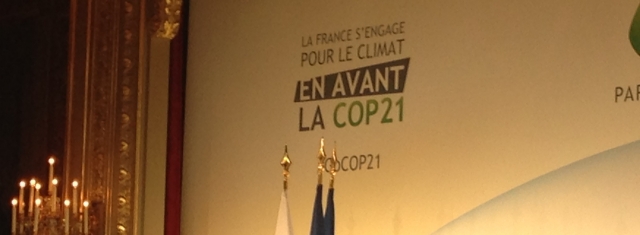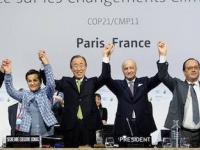Politics
BUSINESS DIALOGUE 4TH SESSION HOSTED BY FRENCH PRESIDENCY
JUNE 10 iNTERNATIONAL CLIMATE NEGOTIATOR

President Hollande at Elysee Palace (Source: Rahma Sophia Rachdi )
USPA NEWS -
In preamble of next COP22, international negotiators & business leaders gathered in Paris on June 10 for a session of the Business Dialogue to discuss issues of international climate negotiations. On these issues, companies and governments have a common responsibility to ensure their implementation.
In the dynamics of the COP22, international negotiators and business leaders gathered in Paris on June 10 for a session of the Business Dialogue to discuss issues of international climate negotiations. On these issues, companies and governments have a common responsibility to ensure their implementation. Gathered by the Minister Ségolène Royal, President of the COP21, the discussions focused on two main topics of the Paris agreement: the price of carbon and reporting of emissions.--------------
THE PRIVATE SECTOR PARTICIPANTS AT THE BUSINESS DIALOGUE CALL ------------------------------------------------
In summary these exchanges, the private sector participants at the Business Dialogue call:
i) Governments to implement the resolutions on transparency contained in the Paris Agreement, in particular through the harmonization of emissions budgets methodologies.-----------------------------------------------------------------------------------------
The companies are engaged to act with governments to fight against climate change. To align their activities with the content of the National Contribution countries (NDCS), private sector actors must deeply understand the national goals. Thus, the private sector participants call for Parties to intervene on the following points regarding transparency:----------------------------
- Coordinate the methodologies used in the preparation of NDCS to allow monitoring and effective reporting,
- To facilitate the external publication of the actions taken and progress made in connection with the Paris Agreement, using the best practices of the UNFCCC.-------------------------------------------------------------------------------------------------------------
ii) private sector players to increase transparency on how they take into account the risks and opportunities associated with climate change in their strategies and in their actions.
Increased investment to low-carbon technologies, in line with the objectives of the Paris Agreement, is essential. Informing investors, lenders, suppliers and customers on their climate strategies, companies encourage their stakeholders to join and support their decisions. In addition to improving the quantitative reporting on climate issues, the private sector participants in Business Dialogue support the implementation of initiatives that will help companies improve their transparency, for example: - Communicate on how climate change is taken into account in developing their strategy and their investment policy, - Define, monitor and communicate their emissions reduction trajectory and plan related to adaptation to climate change.-------------iii) Governments and enterprises to accelerate the deployment of carbon price signals in their economies
CURCIAL QUESTIONS T BE TACLED V+BY THE GOVERNMENTS-------------------------------------------------------------It is crucial that governments: - Accelerate the deployment of carbon prices in their economies (through direct instruments such as the carbon market and ensuring equality between the players), taking into account the issue of competitiveness and developing links between different systems giving a price on carbon, to promote global convergence that will preserve an effective price signal to encourage technological change,-----------------------------------------------------------------------------------
- Define, upon ratification of the Paris Agreement, methodologies and tools specific to the mechanisms of emission reduction transfers between countries to gradually link national policies carbon prices internationally,
- Encourage the use of revenue from the carbon price to drive innovation and the transition to low-carbon technologies, while taking into account local conditions and priorities in terms of public policy. Finally, it is also crucial that companies voluntarily adopt an internal carbon price to align investment decisions with long-term objectives set out in the Paris Agreement.
Cop21 Cop22 Conference Of Parties Paris Marrakech Unfccc Business Dialogue Elysee Palace Climate Change Renewable Energy Rahma Sophia Rachdi
Liability for this article lies with the author, who also holds the copyright. Editorial content from USPA may be quoted on other websites as long as the quote comprises no more than 5% of the entire text, is marked as such and the source is named (via hyperlink).








